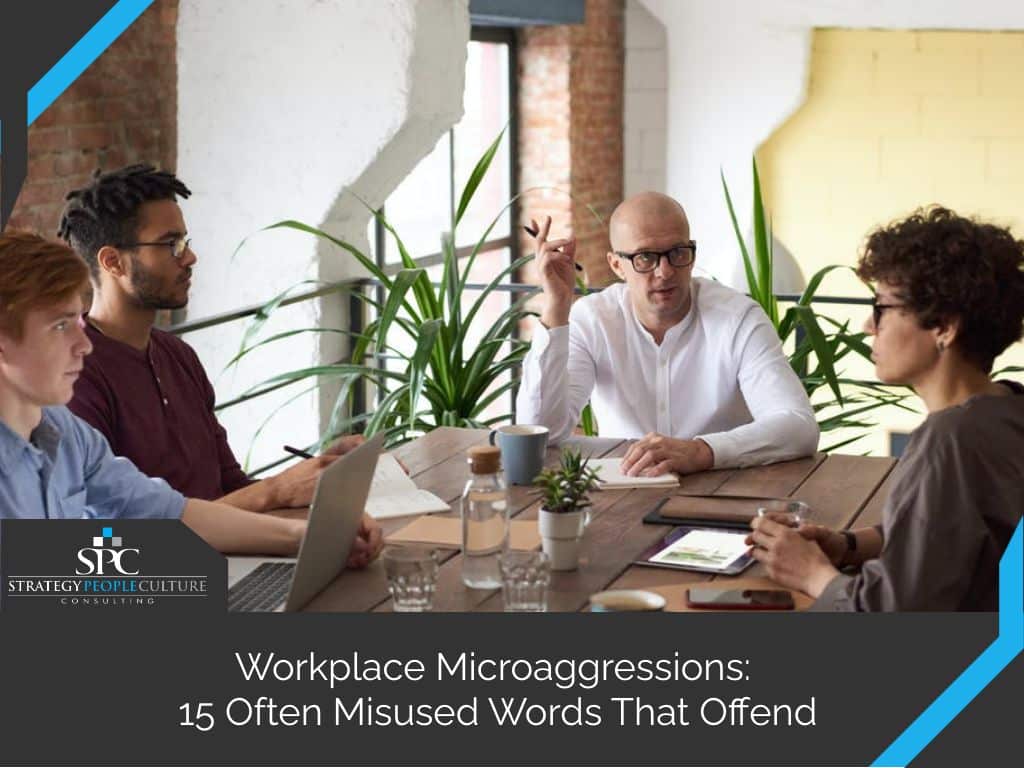Workplace Microaggressions: 15 Often Misused Words That Offend

Thanks to diversity training and heightened awareness in workplaces, many people strive to eliminate phrases and words that can be interpreted as “microaggressions.”
A microaggression can be defined as an everyday behavior or phrase, intentional or unintentional, indicating bias or hatred toward a historically marginalized group. Unlike overt displays of bigotry, microaggressions are often committed by people who do not realize the damage and severity of their words or actions. Have you ever been in that position?
Microaggressions are often conveyed through language. For example, the way we talk about a workplace group, address a person’s ethnicity or label a meeting could be more divisive than you realize in the workplace. Unintentional or not, even a subtle microaggression can offend colleagues.
As we learn and strive for diversity, equity, and inclusion in the workplace, we’re finding more phrases that push buttons and invalidate marginalized groups.
It’s everyone’s job to work toward eliminating microaggressions in the workplace, but people in positions of power and leadership must take on the responsibility. C-suite members and owners set the tone of their workplace environment, and they must represent the kind of language perpetuated within their company.
Although microaggressions are often unintentional, we can be intentional about avoiding certain phrases and words. Here are fifteen you should eliminate from your office conversations pronto.
1. “You speak English so well!”
Although this may sound like a compliment, it can often come across as a national origin microaggression. For example, by complimenting someone’s grasp on the English language when they are working for an American company, you’re essentially saying, “You speak the local language great for someone who is an outsider.”
Highlighting someone’s language skills marks them as different from everyone else. Additionally, you don’t know anything about that person’s background – how long they’ve lived in the States, how they learned English, or where their family comes from.
In general, stay away from compliments that praise people’s ability to speak the local language. Instead, try something like “You have such a great way with words!” or something less specific.
Better yet? Compliment a person’s ability to do a job rather than their language skills.
2. “Where are you actually from?”
By now, most of us understand why this is a workplace microaggression. However, every time you ask this question, you may be interpreted as asking them to explain or even justify their place in the United States – most likely because they look or sound different from others.
You should enter every conversation assuming the person is American – and just that. If they want to share their family’s background or history, that’s up to them.
3. “I’m such a spaz.”
The word “spaz” or “spastic” might sound silly, but for many people, it’s derogative. The root of the phrase comes from the terminology used to describe people with certain medical conditions, such as cerebral palsy.
The next time you bump into a table or spill your coffee, stick to less harmful phrases. For example, no one should be labeled a “spaz,” and even calling yourself one can potentially offend people who actually suffer from spasms or health conditions.
4. “Whitelist” or “Blacklist”
These two phrases are used frequently in many settings – especially technology companies. “White” refers to safe, permitted concepts, while “Black” is often applied to dangerous or off-limits items.
We don’t need to dive too deeply into this racial microaggression to see the problem. So much of the English language ties white to good and black to bad, and there’s no reason to stick to such archaic, problematic themes. So the next time you want to “white list” an email, consider using the term “safe list” instead.
5. “Is that really your natural hair?”
There are long-standing racial and gender biases associated with hair. So what might seem like an offhanded comment could easily trigger feelings of aggression – especially in the black community where there’s a history of hate and judgment surrounding “natural” hair.
Feel free to compliment hair politely, but do not question or call out hairstyles that might be different than what you’re used to. Natural hair discrimination is now illegal in many states, so keep your comments to yourself when in doubt.
6. “Come on, guys.”
To many of us, the term “guys” might seem all-encompassing, but is it really? Unfortunately, not everyone considers the word to be gender-neutral. Using such a specific label, you risk alienating anyone in the room who does not identify as a man.
Many females, transgender men, and women, as well as gender non-conforming team members, will appreciate the emphasis on more inclusive, neutral phrases such as “everyone” or “all.”
7. “He looks like a thug.”
Although the word “thug” might conjure images of a masked highwayman or a bad person for some people, it has picked up increasingly racist connotations – especially in the past few years.
Most specifically, the phrase has been used to describe many Black Lives Matter protesters and victims of police brutality. In many news articles and social posts, groups of black people gathered together quickly became associated with the word “thugs” – and inappropriately so.
Some prominent activists and black writers have even pointed out that “thug” may be evolving into a replacement for the n-word in 2021. Likewise, other black athletes and actors have commented on the word’s racially charged properties.
8. “You look so exotic!”
Complimenting someone’s “exotic beauty” or appearance might seem thoughtful – but it distinguishes them as unusual or strange. Many Latinx and Asian people don’t actually appreciate being told they look different from the rest of the people living in an area.
In today’s society, exotic should never be used to describe a human. Calling a food exotic is acceptable, but a coworker? You risk seriously offending them.
9. “Ladies and gentlemen, boys and girls…”
This is another one of those microaggressions in everyday life. It seems harmless, but in reality, it’s alienating any marginalized group that does not fit into those two categories. In general, it’s time to move away from gendered language.
Stick to phrases like “everyone” or “folks.” You don’t know people’s gender identity or pronouns in every situation, so sticking to more encompassing, inclusive terms is a safer strategy.
10. “My master bedroom” or “master bathroom.”
Although the term’s origin is somewhat debated, there is a consensus that the term “master” harkens to both sexist and racist connotations. It implies the “master” of the house, most likely a white man had the privilege of sleeping in and using the largest, most luxurious room.
Even realtors are halting their use of the word “master” instead of referring to rooms as the “primary” bedroom or bathroom.
11. “I’m so OCD about that.”
OCD stands for Obsessive-Compulsive Disorder – a diagnosis that encompasses far more than the need to be tidy or nit-picky. Claiming that you are “OCD” about something invalidates those who truly struggle with obsessive behavior. It also perpetuates misconceptions and stereotypes about the disorder.
Instead, tell people you like to be tidy or that you’re very particular about the way something is done. There’s no need to bring a legitimate disorder into the conversation.
12. “It’s time for a powwow.”
A powwow is actually a carefully planned, important celebration in Native American history. They are still held today – and they are very different from the meetings you and your team plan in the office.
By calling something a “powwow,” you may unintentionally demean a special part of Native American heritage. Be mindful of other people’s cultures and avoid using their phrases/terminology for your practices, which are likely totally different.
13. “You’d be so pretty if you would smile.”
Many women have been told this at some point or another, and it’s incredibly sexist. Men aren’t told to smile or look pretty in the workplace – so why should a woman? It is not the responsibility of women to look or act a certain way for those around them in an office.
Encourage everyone in your office or team to steer clear of comments on someone’s appearance, but more specifically, to avoid making genderism or sexist statements that alienate certain groups.
14. “The office Christmas party.”
Most companies are fully aware of this blunder, but many offices still put up decorations and send out invitations specifically for Christmas. Although the majority of Americans do celebrate Christmas in some capacity, millions do not.
Stick to “holiday” celebrations that encompass all religious beliefs, from Christian to Jewish to Muslim and those without a religious faith at all. Many non-Christian festivities occur in the surrounding dates – why not create a workplace environment where everyone feels comfortable with their own practices and faith?
15. “She’s pretty much the office mom.”
There are many problems with referring to a female manager or coworker as a “mom.”
Not only does it regulate them to a household position, but it also belittles their actual place in the company. Being a mom is by no means an insult, but downplaying a woman’s role in the workplace is. Just because a female employee is good at remembering birthdays or helping people deal with emotional struggles doesn’t mean she should be treated with the familiarity of a family member.
In Conclusion
Of course, this post merely touches on fifteen commonly used micro-aggressive phrases in the workplace, but many others.
That’s why it’s so important to establish an open dialogue in your office. But, even more so, build a system that allows employees to discuss and report microaggressions safely.
We’ve got a long way to go toward eliminating microaggressions – being a leader by promoting awareness in your place of work is a start.
Do you need help with diversity training or executive leadership skills in the workplace? At Strategy People Culture, we foster better awareness for both people and businesses. Schedule a free consultation by calling (833) ROCK – SPC or send us a message online.




